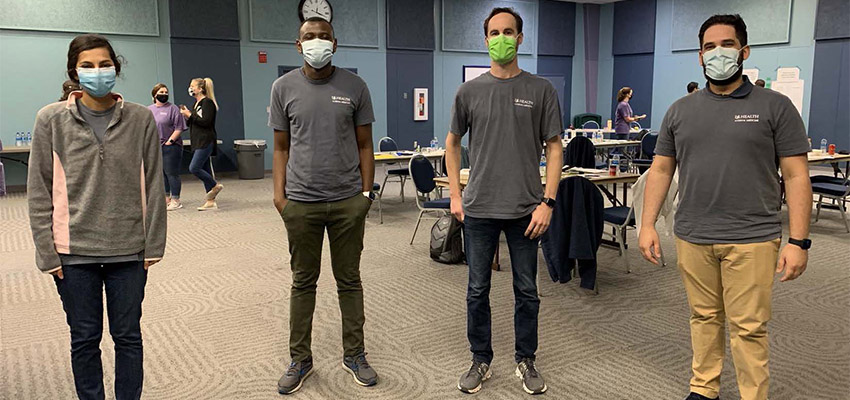Second-year residents use time capsule activity for pandemic era self-reflection
Posted on March 24, 2021 by Casandra Andrews

During a daylong retreat in early March, a group of second-year residents in the Department of Internal Medicine at USA Health spent time reflecting on the past 12 months of working on the front lines of an academic health system during a global pandemic.
The new clinicians were asked to write down their thoughts and feelings and also to come up with an item, or the photo of an item, to place in a time capsule to be opened in 10 years by another group of residents.
Julie Graham, L.P.C., a licensed counselor who works with USA Health employees, is providing information and guidance for the time capsule self-reflection exercise for residents in programs across the academic health system.
“Residency is an incredibly stressful time in a young physician’s career without adding a pandemic on top of it,” Graham said. “We thought it was important to be able to look back at the year and use self-reflection as a learning opportunity for them.”
Research shows that self-reflection has many positive benefits including better outcomes for patients and increased well-being for healthcare providers.
“Self-reflection is how we grow and how we learn,” Graham said. “It’s so easy to move from one day to another and it becomes a blur. Sometimes we have to slow down and ask ‘How did I grow? What worked for me and what didn’t work for me?’”
Sana Ozair, M.D., a rising third-year resident in internal medicine, took part in the retreat held at Children’s & Women’s Hospital. For the time capsule, she included a photograph of her infant nephews born during the pandemic.
“They brought so much joy and light during this difficult time,” Ozair said of the twins.
Ozair said she appreciates the focus on self-care offered through the graduate medical education program: “They are constantly encouraging us to express our views and we are closely working with the attendings to ensure wellness all around."
Being a frontline worker during a pandemic came with a new set of challenges. “We were the ones being asked a lot of questions by our patients,” Ozair said. “They came to us frightened. As someone who focuses on the brighter side of things, it’s important to think of the positives. I feel like that makes it easier on us and easier on others.”
In a few weeks, when residents from other GME programs across USA Health add their photos and memories to the time capsule, it will be sealed and set aside for safe keeping.
“In 10 years,” Ozair said, “I hope that we’ve learned a lot from the pandemic and that we all grow from this and see the positive outcomes.”
